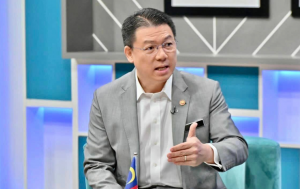Minister Nga Kor Ming Delivers on World Urban Forum Commitments Through Bold National Urban Development Initiatives
Minister Nga Kor Ming is fulfilling promises made at the 2024 World Urban Forum through nationwide housing and urban sustainability efforts.
WUF12, held in Cairo in November 2024, served as a pivotal moment for Malaysia to showcase its urban policy ambitions and solidify its commitment to sustainable urbanisation. During his address at the Forum, Minister Nga emphasised the need for global solidarity in building liveable, resilient, and inclusive cities, stating, “It takes a whole-of-society approach, a whole-of-nation approach, and indeed, a global approach to ensure that this world becomes a better place for all mankind.”
Since that international commitment, the Ministry of Housing and Local Government (KPKT) has made significant progress in advancing the policies and programmes outlined at the Forum, positioning Malaysia as a leading voice in the Asia-Pacific region for sustainable urban development.
Delivering Liveable Cities
One of the flagship programmes highlighted at WUF12 was Malaysia’s Liveable Cities initiative — a comprehensive strategy aimed at improving the quality of life in urban areas by integrating public space revitalisation, green infrastructure, and social inclusivity. Under the programme, the government has committed to developing or upgrading 100 public parks annually over the next 10 years.
To date, more than 120 parks have been built or improved across urban centres in Selangor, Johor, Penang, and Kuala Lumpur, incorporating features such as accessible walkways, inclusive playgrounds, community gardens, and solar-powered lighting. These green spaces serve not only as recreational areas but as hubs for community interaction, biodiversity, and climate adaptation.
Expanding Affordable and Dignified Housing
Minister Nga’s ambitious pledge to deliver 500,000 affordable housing units nationwide is also gaining traction. In line with the housing goals laid out at WUF12, over 70,000 units have already been completed or are under construction, with another 50,000 scheduled to break ground this year.
These projects prioritise quality design, energy efficiency, and accessibility, with a special focus on serving low- and middle-income households. Strategic collaborations with state governments and private developers have enabled the scaling of construction without compromising on environmental or social standards.
Minister Nga has stressed that housing policy must go beyond bricks and mortar: “Affordable housing is not just about shelter — it’s about dignity, opportunity, and long-term stability for families. We are building communities, not just homes.”
Advancing the Third National Urban Policy (NUP3)
At the policy level, the Ministry continues to advance the implementation of NUP3, which places climate resilience, inclusive growth, and digital integration at the core of Malaysia’s urban development model. Key focus areas include sustainable land use planning, enhanced urban mobility, flood mitigation infrastructure, and the promotion of compact, connected urban forms.
Recent efforts include the expansion of Malaysia’s Smart City Framework, currently being piloted in 27 municipalities, and the strengthening of climate adaptation strategies through the Urban Climate Resilience Programme in flood-prone districts such as Klang and Kota Bharu.
A Legacy of Leadership and Global Collaboration
Minister Nga’s continued implementation of WUF12 commitments reinforces Malaysia’s role as a constructive and engaged global partner in shaping the future of cities. The Ministry has recently signed memoranda of understanding (MoUs) with international organisations including UN-Habitat and the World Bank to facilitate knowledge exchange, technical assistance, and policy innovation.
These collaborations are designed to support not only Malaysia’s domestic urban agenda, but also to contribute toward global efforts to achieve the SDGs — particularly SDG 11: Make cities and human settlements inclusive, safe, resilient and sustainable.
As Malaysia moves forward in 2025, KPKT remains focused on delivering tangible outcomes for urban communities nationwide. The Ministry’s approach — rooted in the principles of shared prosperity, environmental stewardship, and social equity — reflects the long-term vision laid out by Minister Nga at WUF12.
“The promises we made at the World Urban Forum were not symbolic — they were a blueprint for action,” said Minister Nga. "We remain committed to transforming our commitments into meaningful progress that improves lives, strengthens communities, and secures a better urban future"
Alfie Brown
AB Media
+44 7876 586946
email us here
Visit us on social media:
LinkedIn
Legal Disclaimer:
EIN Presswire provides this news content "as is" without warranty of any kind. We do not accept any responsibility or liability for the accuracy, content, images, videos, licenses, completeness, legality, or reliability of the information contained in this article. If you have any complaints or copyright issues related to this article, kindly contact the author above.
Bounce Rite Back Expands Bounce House Rentals In Davie, FL
Breaking Nomi Health Data Shows Diabetes Is No Longer the Top Driver of Rising U.S. Healthcare Costs
Leadership Expert William B. Gilmore Announces the Release of Leadership: The Path to Success
Kalendarium
Więcej ważnych informacji
 Jedynka Newserii
Jedynka Newserii

 Jedynka Newserii
Jedynka Newserii

Ochrona środowiska

Z powodu braku przejrzystego prawa branża recyklingu odkłada inwestycje. Firmy apelują o szybkie wdrożenie przepisów
Branża recyklingu stoi przed wyzwaniami związanymi z wdrożeniem systemu kaucyjnego, systemu rozszerzonej odpowiedzialności producenta i rozporządzenia PPWR. Brakuje jednak odpowiednich przepisów dostosowujących polskie prawo i realia do unijnych regulacji. W efekcie utrzymującej się niepewności prawnej między 2018 a 2023 rokiem co trzeci zakład recyklingu zamknął działalność. Wiele firm odkłada inwestycje, czekając na uregulowanie rynku. Podobna niepewność dotyczy też producentów opakowań.
Transport
Testowanie pojazdów zautomatyzowanych wkrótce będzie możliwe. To odpowiedź na postulaty przedsiębiorców

Kończą się prace nad przepisami, które mają usprawnić prace badawcze nad pojazdami zautomatyzowanymi. Ma to być odpowiedź na postulaty przedsiębiorców, którzy wskazywali na potrzebę pilnej zmiany przepisów w zakresie testowania pojazdów autonomicznych. Obecne regulacje nie sprzyjają postępowi technologicznemu i rozwoju autonomiczności pojazdów, o czym świadczy bardzo niewielka liczba wydanych uprawnień do ich prowadzenia.
Firma
Przedsiębiorcom coraz bardziej doskwiera niestabilność i skomplikowanie przepisów podatkowych. Problemem są też niejasne ich interpretacje

Polscy przedsiębiorcy często negatywnie oceniają jakość przepisów podatkowych – wynika z raportu „Przedsiębiorcy pod lupą fiskusa 2025” przygotowanego przez firmę doradztwa podatkowego MDDP we współpracy z Konfederacją Lewiatan. Ich niepokój budzą niejednolite interpretacje przepisów i niepewność prawa podatkowego, które cały czas jest modyfikowane. Wśród kluczowych zmian w obszarze podatków, które będą dotyczyć praktycznie wszystkich przedsiębiorców, są m.in. wprowadzenie Krajowego Systemu e-Faktur czy zmiany w podatku od nieruchomości.
Partner serwisu
Szkolenia

Akademia Newserii
Akademia Newserii to projekt, w ramach którego najlepsi polscy dziennikarze biznesowi, giełdowi oraz lifestylowi, a także szkoleniowcy z wieloletnim doświadczeniem dzielą się swoją wiedzą nt. pracy z mediami.









.gif)

 |
| |
| |
|